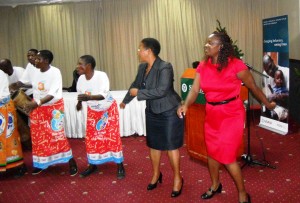 We hosted more than a dozen events in 2011—including a series of meetings in Washington, DC, and end-of-project gatherings in seven countries—to celebrate accomplishments, share experiences and resources, and discuss future directions for nutrition programming. We are grateful to the more than 1,000 partners and colleagues who joined us at these events—contributing valuable insights during lively discussions about practical solutions for reaching mothers and children with nutrition interventions. Discussions resulted in many partners pledging to carry forward with IYCN’s work and to continue building on momentum to address maternal and child malnutrition.
We hosted more than a dozen events in 2011—including a series of meetings in Washington, DC, and end-of-project gatherings in seven countries—to celebrate accomplishments, share experiences and resources, and discuss future directions for nutrition programming. We are grateful to the more than 1,000 partners and colleagues who joined us at these events—contributing valuable insights during lively discussions about practical solutions for reaching mothers and children with nutrition interventions. Discussions resulted in many partners pledging to carry forward with IYCN’s work and to continue building on momentum to address maternal and child malnutrition.
Highlights include:
- Malawi, December 2011. Panelists concluded that putting a new cadre of community nutrition workers in place across the country will help to prioritize nutrition in communities and reduce the workload of existing community-based workers. They also discussed how to overcome challenges in reaching the government’s goal to implement the new cadre. Following the event, panelist Dr. Mary Shawa, the Principal Secretary for Nutrition and HIV/AIDS at the Ministry of Health, highlighted key points from the discussion during a nationally televised interview.
- Haiti, December 2011. In her opening remarks, Dr Jacqueline Gauthier, President of the Haitian Pediatric Society, emphasized that national guidelines for promoting exclusive breastfeeding—developed by the IYCN Project—were a crucial tool for convincing pediatricians and other stakeholders about the importance of exclusive breastfeeding, including within the context of HIV.
- Ethiopia, December 2011. Addressing participants, Sheri-Nouane Duncan-Jones, the head of HIV/AIDS programming for the US Agency for International Development office in Ethiopia, said that “as we work towards the goal of achieving an AIDS-free generation, we must remember that nutrition and feeding are unquestionably linked to HIV/AIDS programs.” Read a summary of the event on Nazret.com, a national blog: U.S. Focuses on Improving Infant and Young Child Nutrition in Ethiopia.
- Ghana, December 2011. Wilhelmina Okwabi, the Deputy Director in Charge of Nutrition, led a discussion on continuing momentum to improve complementary feeding practices. She urged Brong Ahafo Region to roll out a social marketing intervention developed by IYCN, the Global Alliance for Improved Nutrition, PATH, and the Ghana Health Service to an additional 13 districts, and encouraged district health officials to create a timeline for training health workers to strengthen infant and young child feeding counseling skills in 2012.
- Nigeria, October 2011. Governmental and nongovernmental partners committed to work together to fund and continue implementing the project’s nutrition training efforts for health workers and community workers in 28 states and to print counseling job aids for all training participants.
- Washington, DC, August 2011. Following a presentation of IYCN’s preliminary results from a review on the relationship between maternal and child diets, the Food and Agriculture Organization of the United Nations invited us to share the final results with international nutrition stakeholders during a symposium in Rome in January 2012.
- Washington, DC, August 2011. After the launch of our tools for agriculture project designers, India’s National Rural Livelihoods Mission and Nigeria’s National Programme for Food Security began adapting the tools for national use.
- Washington, DC, July 2011. Since launching our collection of materials for strengthening community nutrition programming, we have distributed more than 5,500 copies of the materials to stakeholders around the world and many colleagues have planned to adapt the tools for use in their programs.
- Zambia, March 2011. Following discussions about community interventions at an event with 100 key stakeholders, the United Nations Children’s Fund printed and disseminated more than 60,000 copies of community training materials, developed by the project and partners, to community health volunteers across the country.
Photos: PATH/Evelyn Hockstein, Valerie Kushata
Date: Feb 12, 2012 | Category: Events


